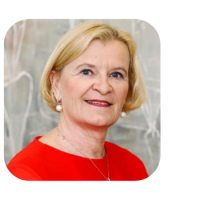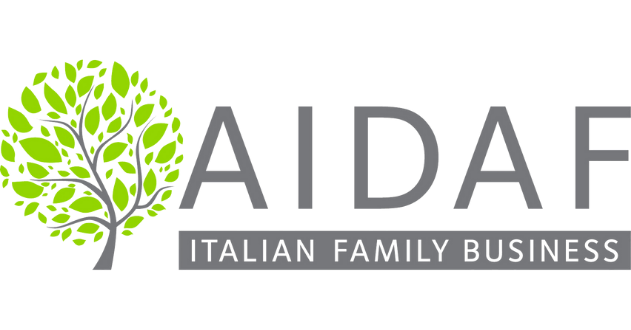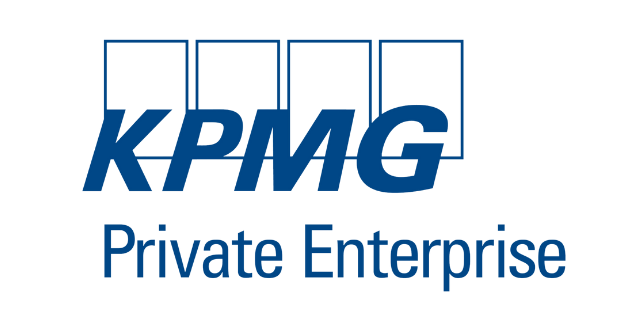EFB Newsletter 2021
EFB Governance
At the extraordinary General Assembly on the 23th November 2021 the Members of EFB had the chance to vote for two new members of the EFB Executive Committee as well as a new Vice-President of the EFB Executive Committee. These votes were held via electronic poll due to the ongoing health situation.
EFB President, Mr. Udo J. Vetter, thanked the outgoing members of the committee, Mr. Alexander Bargum and Mr. Luc Darbonne, for their commitment, dedication, and contribution in the EFB Executive Committee over the last years. The chairman noted that both encapsuled the family business community´s vision and mission.
With this governance transition, EFB welcomes now two exceptional new members.

Ms Marjo Miettinnen has been approved as a new member of the EFB Executive Committee via electronic poll. Marjo Miettinen is one of the owners and Chairwoman of Ensto Group, an international technology company and a family business founded in 1958. She has previously worked in several executive management positions at Ensto Group, including eight years as CEO of EM Group.

Mr Arnaud Vaissié has been approved as a new member of the EFB Executive Committee via electronic poll. Arnaud Vaissié is a Board member of the Institut Montaigne as well as a Board member of the Meti (Mouvement des Entreprises de Taille Intermédiaire) which gathers 5.400 French mid-sized companies (ranging from 250 to 4 999 employees). He is the founder and Chairman of the Lycée International de Londres, Winston Churchill and a graduate of the Institute of Political Sciences of Paris (Sciences-Po).

Mr Jan Kornelis van Oord has been approved as the new Co-Vice President of the EFB Executive Committee via electronic poll.
EFB wants to thank all of its Chapters for their participation and we wish our out-going Executive Committee Members all the best in fulfilling their future endeavours
You can find EFB´s organisational chart here.
EFB Team Brussels Update

Our current EFB Junior Policy Advisor, Mr. David Breyer, will be leaving our Brussels office by the end of January 2022 to seek a new challenge. EFB wants to thank Mr. Breyer for his professional commitment in our family business mission over this last year that has been challenging and we wish him all the best for his future.
From March 2022, the position of Junior Policy Advisor will be taken by Joana Peixinho. Joana is a Portuguese young professional who has recently concluded a bluebook traineeship at the European Data Protection Board; she has an undergraduate degree in History and International Relations and holds Master of Laws in International Development Law and Human Rights.
At EFB we are confident that Joana will effectively discharge her tasks and look forward to welcoming her to our team.
EFB Summit 2022
In spite of the on-going health crisis, and after consultation with its members and working committees, EFB has committed to hosting its EFB Summit 2022 physically.
As such, we are delighted to announce that the EFB Summit 2022 will be held in Berlin, in partnership with our German Chapter Die Familienunternehmer and we look forward to once again meeting our members and business owners across Europe then. You can find all information here.

New EFB Member:

It is with great pleasure that European Family Businesses announces that AIdAF, the Italian Association of Family Businesses, has joined our federation.
AIdAF was founded in 1997 by Alberto Falk together with a group of entrepreneurs bound by the same principles and today encompasses more than 200 family businesses, gathering more than 600,000 employees and representing approximately 15% of Italy’s GDP.
Aidaf is presided by Francesco Casoli, Executive Chairman of Elica, the world’s leading producer in the cooker hood sector.
EFB, and the whole community of European family-owned companies, is happy to welcome our Italian friends to our federation, and very much look forward for a close and fruitful collaboration.
You can learn more about AIdAF here.
EFB launches Circle of Supporters
Since 1997, EFB has been defending family businesses in Europe, highlighting the important role that our sector plays in supporting jobs and growth in Europe. In addition, we have been working hard to ensure that European and National regulations to not negatively affect the functioning of family firms, instead supporting their continued success.
We have a strong track record of defending our community through targeted outreach and thought leadership on key policy issues such as, succession, equity finance, and corporate governance.
In the coming years, we have perceived that it will be more important than ever for family enterprises to speak as one voice. With the economic fallout of the COVID-19 pandemic, it is more than likely that family companies will be called upon to support their respective governments by shouldering the bulk of the financial cost.
To boost our advocacy efforts and engagement with the family business community, we are launching the ‘Circle of Supporters’. The Circle will enable EFB to better represent its members as well as improving the contribution that the family business community makes to public discourse. As well as providing financial support to our organisation, it will make a positive impact for the wider community.
The support of family businesses is critical to the success of our common mission.
Now, more than ever, the family business community must unite around a common vision. It must be prepared to defend its business model and show to the world its contribution to social cohesion and society.
Through their commitment, the Circle of supporters will directly help family businesses across Europe.
If you would be interested in the project or would even like to support our common vision and mission, please contact:
EFB - Family Business in Focus
With the new series Family Business in Focus, EFB aims to provide its members with input on family business aspects from different perspectives from academia, teaching and personal experience.
The first article of this series has been put together by Mr. Peter Jenner. Peter is an Alumnus of the US Government’s International Leadership Program. He is a Chartered Engineer and has an MSc in Engineering. He has written numerous practical guides for business and the environment, funded by the UK and US Governments, and the EU, and has just jointly authored with Professor Salvo Tomaselli, under the SPRING project a practical Handbook for Succession within Family businesses. Please send any feedback or comments regarding the new series to amontoto@europeanfamilybusinesses.eu.
As a leader of a family business what is your legacy?
What is your legacy and what will happen to your family business when you leave or retire? Succession Planning is the key! Creating the structures and choosing the right people are vital to ensuring that the business will continue to survive and thrive and to deliver the desired legacy “End Game.”
- Succession and ownership, resolved
- Te family is supportive of the future
- Values are clear and act as a “rudder”
- Confidence in the future strategy with enthusiastic & committed staff
- Everyone knows, what they must do
- People really act as a Team, and roles and responsibilities are clear
- Jobs and Secure, Career opportunities are transparent and progress in merit
The European Commission estimates that 450k businesses, representing two million jobs EU wide, are subject to transfer of ownership every year. Succession done well takes a family business to new heights of achievement, done poorly sows the seeds of decline!
The EU funded Erasmus + SPRING Programme has produced a practical Family Business Succession Handbook and mobile self-assessment app, both of which are designed for small and medium sized family-owned businesses. The handbook has been developed as a route-map for succession directly addressed to the CEO and leaders of family-owned businesses who are the “gate-keepers” of both legacy and succession. Twenty-five years of practical experience by the author, aims to put the business owner and CEO in control of the entire process. This handbook delivers on the practicalities of what is termed “the third leadership challenge,” which is to prepare the family business for succession, at the same time as preparing the potential successors for future roles within family enterprises.
The first two leadership challenges for CEO of family businesses are of course the Entrepreneurship skills to establish the business in the first place through a combination of innovation, hard work and tenacity. The second being the need to create the business structures to sustain and grow the business into maturity.
The third leadership challenge of family businesses planning for succession, requires a different skill set, to address the following complementary tasks, the overview of which cannot be entirely delegated.
Pebble in a Pond!
Succession can best be illustrated in its complexity by comparing it with what happens when a pebble is dropped in a pond. The concentric circles that are generated, can each help to illustrate the relationship between the issues that will need to be addressed within a comprehensive family business succession programme. Each of the following interactive areas will need to be commenced simultaneously to provide a one-stop-shop approach. They are:
1. Legacy and Aspirations
2. Strategy for Succession
3. Selecting and Developing Successors
4. Governance
5. Transition Ladders
As CEO of a family business, you will need to obtain legal, tax and financial advice that will be essential to creating the overall “envelope” for succession planning. Since these structures will differ within each member state then these are not included within the handbook.
Practical experience of delivering succession programmes within small and medium sized family business, has shown that it is never a good idea never to launch this programme under the banner of succession. Once the ground rules have been agreed with the Chairman and CEO, it has been described to the managers and staff as a “high growth programme” with the aim to increase business value and yet each domain that combines to deliver future success has a biproduct of successful succession. This approach also has a fall-back position, that, if all else fails, the business is prepared for a trade sale at maximum value. Calling a programme “succession,” is in my opinion a big mistake, since it brings out of the woodwork all manner of previously repressed conflict and perceived entitlements, that can damage family relationships and the business itself. Rather is the aim to gain the support of everyone to work together to improve and grow the business and secure its future through good strategy and governance structure, innovation and putting the right people in the right place, using the 5 Rights to succession.
The 5 Rights are the Right person, with the Right skills, and Right attitude at the Right place at the Right time.
Experience has shown that to deliver the 5 Rights in practice, requires each of the above five domains to be addressed simultaneously to prepare both the business and the successors for succession that delivers growth. You as the CEO or major shareholder must be in control of the whole process. This is not in terms of delivery but to ensure progress and hold people to account, and importantly to “dissolve the treacle,” of “why things don’t change around here, to ensure progress and measurable results! This overview is vital since this is a major investment in the business, and you should expect a 10:1 ratio of return on investment. The domains listed above are discrete and detailed with challenges and solutions throughout the handbook, but they also interact, if the process is to work and the business transformed. This is vital for succession, in the situation where growth creates the “headroom” for successors to assume new responsibilities and to prove themselves. In a nutshell, the biggest challenge that I saw time and again in family business, was the aim for “fairness among successors” and the confusion between love for the family and concern for the business.
Parental Fairness
Leaving the business in equal parts to all the children in second or third generation family businesses, in the hope that they will eventually work together and drive the business forward, is a confusion of love for the children and duty of care for the business!
More than twenty years ago I spoke at a conference in Republic of Ireland on the topic, (not chosen by me!) of Don’t Give it to the Children. The hall was literally packed with owners and managers of family-owned businesses.
The title does not mean to convey the fact that you as the CEO, owner / manager of the family business should disinherit your children! But should this inheritance be given without work and proof of commitment? Also, should the inheritance in terms of shares in the business be divided equally amongst all the children, irrespective of competency and the business results that they have delivered?
The aim of this article is to encourage you as the CEO, Chairman, or leader of a family business to download and use the app and to then read the SPRING Family Business Succession handbook. Then to commence or reinvigorate the succession process within your respective family businesses. The handbook is very direct in its use of language since each chapter contains challenges that must be addressed for successful succession. Nothing worthwhile is obtained easily and without effort, but the handbook provides a pathway, and a route map to follow full of practical tips, how-to solutions, and case studies, many of which provide a “wake-up” call to action.
The seven habits of a Successful Succession Strategy Succession in family business must follow a process.
1. Be proactive- Third Leadership Challenge.
2. Clear aspirations and inspiring values.
3. Winning strategy – ladder of pivotal objectives as critical game changing actions.
4. Focus on future skills, successors, and transfer of vital knowledge.
5. Governance structures that clarify and separate family and management roles.
6. Personal accountability and empowerment through a meritocracy.
7. Pass the baton and “let-go”.
Where are you now? The SPRING Succession Self-Assessment app and Practical Challenges
The handbook links directly to the self-assessment app which poses challenging questions in vital areas which include the following:
• Resolution of future ownership
• Transfer of roles
• Good strategy
• The 5 Rights
• Sound Governance
• Communication and trust
• Parental Fairness – the seeds of disaster
• Carbon copy CEO?
• Strategic thinking – consider the unthinkable!
• Talent Spotting – Successor Potential
• How deep and wide is your Talent Pool?
• Lethal Reasons for recruiting a Board of Directors!
• The Chairman / CEO. with a hand on the tiller.
Taking off and landing!
Succession with a family business has been compared to the analogy of a plane in flight. The most dangerous time is at take-off and landing! Succession is like landing and taking off again with a new pilot at the controls!
Few people appreciate the demands and pressures of being the owner / manager and leader of a family business. The role is a way of life, rather than a job or profession, it means both a total personal and professional commitment. To lead a family enterprise through both good and bad times and, from creation through survival to success and eventually succession, is a major leadership challenge. The stress of fulfilling multiple roles, leader, strategist, technical expert, ambassador, and arbitrator is singularly demanding. Add to this the imperative to protect your legacy, prepare the business for succession, and select and develop worthy successors, it is fully understandable that many owner / managers put this off because of the already crowded demands of their role. The most dangerous time for any family business is the time of “passing the baton” at the point of succession, selecting the next leader and potential owners. It is a monumental task and getting it wrong could fatally damage the family business and jeopardize the legacy. Getting it right secures the future of both the family and the business, for many years and sometimes generations to come!
At the beginning of a New Year, please take time out to answer the self-assessment objectively. and then read the handbook and follow the journey, which I know that you will find to be both personally and professionally rewarding.
The link is detailed here.
EU - Erasmus + Projects come to an end
In December, both of our Erasmus Plus Projects (SPRING and SUFABU) came to an end. We want to 0 thank all partners, panellists, participants and members for their support and participation over the last two years. Both EU Projects have been a huge success for the family business community and will give practical help to the millions of family businesses in Europe.

Together with its friends from EDHEC Business School, EFB organized the final dissemination event of the SPRING EU-Project on the 3rd of December 2021.
Under the event description “Lessons on succession and regeneration of family businesses in Europe for a sustainable growth”, the audience had the chance to participate in a virtual visit and a live family business case.
Léopold Marraud des Grottes, Co-CEO and 2nd generation, ELITIS, France shared his inspiring family business succession and growth story with the audience.
This was followed by a panel discussion with European leading family business experts and members on the challenges, pitfalls and lessons of a succession process conducive to growth.
Mr. Jesus Casado, Secretary General, European Family Businesses, Ms Rania Labaki (Associate Professor and Director, EDHEC Family Business Research Centre), Mr Georges Maregiano (Partner and Head of Family Business mid and large cap market KPMG France), Mr Léopold Marraud des Grottes (Co-CEO and second-generation family business member, ELIT/5, France) and Mr Thomas van Waeyenberge (Member of the board of FBN Belgium) shared their high-level experience and thoughts from several family business perspectives. Afterwards the audience had the chance to ask several questions to the panel.
The event concluded with the major outputs of the SPRING EU project.
Succession and regeneration remain among the main challenges that European family businesses face. From 2019 to 2021, the SPRING EU consortium explored these challenges and developed a series of outputs that support family businesses in dealing with them to ensure sustainable growth. These include a succession handbook, an educational and consulting e-program, a mobile app and a series of seminars and conferences.
To get more Information on the SPRING project and Its outputs to support family businesses please follow.

EFB SUFABU FINAL EVENT 23-24th September 2021
For the final SUFABU event, EFB managed to invite several high-level speakers and arranged thought provoking panels on “succession in family business” and “transfer of business”.
Day one was kicked off by Mr. Jakub Škába who gave the audience a clear overview on the main idea and concept of the SUFABU project.
This was followed by an outstanding presentation on “Succession in the family business: Potential pitfalls and how to overcome them” by Ms. Rania Labaki, Director of the EDHEC Family Business Centre and Associate Professor of Management at EDHEC Business School.
After her Presentation the audience had the chance to listen to a high-level Panel discussion on the topic. Beside of Ms. Labaki who took the moderator role the panel was completed by Ms. Simone Møkster (Family Business Expert, FBNorway, 2nd Generation owner of Simon Møkster Shipping) and Mr. Oliver Sargent, (Non-Executive Chairman, Applerigg).
Day two started with the next thought-provoking panel discussion on “Transfer of Business: EU Policy Perspective”. Moderated by EFB’s own Darius Movaghar (Senior Adviser), Ms. Lucyna Kaminska, (Policy officer, SME unit, Directorate General for Internal Market, Industry, Entrepreneurship and SMEs, European Commission) and Mr. Hugo Bovesse, (Secretariat General of Transeo) who spoke at length on the future direction of the business transfer policy framework in Europe.
The day got completed by the Panel Discussion on “National Perspective on Family Business”.
Mr. Casado (Secretary General of EFB) had the pleasure to moderate a business meets academics panel with the participation of Ms. Hana Procházková, (Managing Director of FBN Czech Republic), Mr. Joseph Gerada, (Managing Director of Family Business Office Malta) and Ms. Daniela Montemerlo, (Professor of Strategic Management in Family Firms at Insubria University and Bocconi University).
EFB wants to thank all the project partners and participants for their engagement at this outstanding event on “succession in family business” and the positive feedback that has reached us.
To get more Information on the SUFABU project and Its outputs to support family businesses please follow.
A word from our sponsors:

KPMG Private Enterprise has sponsored and supported the mission and values of EFB and its members for more than nine years. KPMG professionals (RC) have always welcomed the opportunity to work collaboratively with you and all the members in promoting the growth and continuity of family businesses across Europe and the rest of the world. I think that ours (RC) is a special relationship, and never have our collective efforts been more important than those we took together over the past 18 months.
As we look ahead at 2022, it continues to be difficult to predict what might be on the horizon. As one family business leader said to me recently, “When we’re so sophisticated, who would have thought that something like a pandemic could come along in the 21st century and change everything for everyone in the entire world?” It’s an important reminder that the best way forward is to remain sensitive to what’s happening continuously in our surroundings and to be ready and agile enough to take appropriate action in real time.
Right now, “business transformation” seems to be on everyone’s lips, and I don’t believe anyone is better equipped than family businesses when it comes to creating a culture of “continuous transformation” in your businesses. This became clear during the pandemic – and I believe the ability to continuously transform has become one source of the widely recognized resilience of your family and business.
While technology and digital transformation continue to rise in importance, they are enablers of many changes that may need to take place. However, digital transformation is not synonymous with the broader transformation of your business strategy and operations. The adoption of new technology alone is inadequate if the goal is to continuously assess and improve not only how you operate, but why.
In family businesses, the answers are embedded in the purpose and culture of the family as well as the business – the human impact; environmental and social issues; governance and accountability – essentially, everything that is important to both the family and its business.
To me, that means business transformation should cross a wide spectrum of opportunities. For example, I know of many family businesses that sorted out their back offices during the pandemic to save costs and manage their liquidity. Now I see a shift towards the front office with customer-facing strategies; environmental, social and governance (ESG) priorities; and revisiting the shared purpose appearing at centre stage.
Those all represent a proactive, rather than reactive, approach to change, and I see the importance of a culture of continuous transformation and shared accountability becoming the bedrock of many family business discussions.
This concept of continuous transformation requires a lot of rigour, though. Someone must be accountable for making sure there’s the drive, pressure, energy and dedication to keep a sharp eye on what’s really happening in the business, what the future prospects look like and being ready to take action.
In the first generation of a family business, accountability is relatively easy. The CEO/senior management/and family are all the same person. When the focus is first on business survival and then on growth, not a lot of structure is required. That changes with success. As the business grows, it becomes necessary to adopt more of a corporate-style structure for performance management, accountability, and compensation.
Often, that includes more formal accountability for business results – through external independent directors on the company board, for example, or through advisory boards that don’t have voting authority or control but do have the ability to hold management to account. I’m also seeing more family businesses exploring new governance mechanisms, such as family councils that have a trusted external advisor assuming the role as Chair to challenge the objectives, strategies, and actions the family is planning to take.
Continuing change and innovative opportunities to transform and revitalize your business are clearly on the horizon. As we kick off another year, I invite you to consider the ways in which you can continuously transform your business and continue to create value for your family, your business and your many important stakeholders.
I would be delighted to hear from you at any time to learn more about your approach to the continuous transformation of your business – and potentially, your entire industry. Please feel free to contact me any time at tom.mcginness@kpmg.co.uk
My very best wishes to you, your families and the success of your businesses in the year ahead.
Tom McGinness, Global Leader, Family Business, KPMG Private Enterprise, Partner, KPMG in the UK.
New EFB Webpage – Update Jan 2022:
EFB is proud to announce that the brand-new EFB Webpage will be available from Jan 2022. After a construction period of almost one year, EFB managed to implement a Webpage that combines a user friendly application with high-level family business content. A brand-new look has also been successfully included.
- Please check out the new EFB-Webpage.
- Policy, Position Papers and Studies can be found here.
- The newly integrated social media wall to promote EFB´s social media activity can be found here.
- Since we are always looking for the optimal representation of our members, please send any suggestions and or possible corrections to amontoto@europeanfamilybusinesses.eu.

Join our newsletter
Stay informed with our newsletters & Invitations
